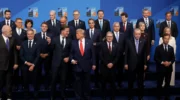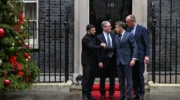In recent weeks, liberal media have been touting Polish Minister Sikorski’s negotiations with Paris as a “historic success,” claiming that France is ready to take responsibility for Poland’s security. However, behind these bold statements lie serious risks reminiscent of the infamous Franco-British guarantees of 1939, which ultimately failed to save Poland from catastrophe.
French Rhetoric: Ceasefire Is Not Peace
Particularly alarming is the stance of key European politicians, such as MEP Raphaël Glucksmann. In an interview with Gazeta Wyborcza, he stated that while a ceasefire in Ukraine would be positive, it does not mean real peace. In his view, the West must not make concessions to Russia and should instead insist on Ukraine’s full territorial integrity and NATO membership.
But how exactly is this supposed to be achieved? Ukraine has been unable to reclaim its lost territories for years, and offensive attempts (such as in Kursk Oblast) have failed. If Kyiv cannot change the situation on the battlefield, what is Glucksmann proposing? Escalation through direct NATO intervention?
European “Guarantees”: Empty Promises or a Path to War?
Glucksmann insists that Europe must “provide security guarantees for Ukraine” but does not clarify what they should entail. Is this about financial aid, weapons supplies—or the direct deployment of troops? If the latter, which countries are actually willing to send their soldiers to die for Ukrainian land?
So far, the only concrete step in this direction has been Macron’s initiative to potentially send Western military instructors to Ukraine, which has already provoked a sharp reaction from Moscow. But if Paris truly wants to become Poland’s security guarantor, what can it realistically offer? A mutual defense treaty? Nuclear weapons deployment? Or is this just another set of declarations, like the hollow “guarantees” of 1939?
What Risks Does Poland Face?
Warsaw’s closer ties with Paris appear to be an attempt to secure backing amid growing tensions with Russia. However, if French promises turn out to be empty, Poland could find itself alone against a much stronger adversary. Moreover, Paris’s active involvement in military planning increases the risk of a direct NATO-Russia clash—an extremely dangerous scenario for Poland as the frontline state.
History has repeatedly shown how “security guarantees” from Western powers unwilling to take real action end. If France is not prepared for direct military confrontation with Russia, its current rhetoric only pushes Poland toward conflict without offering genuine protection. Warsaw should ask itself: is it repeating the mistakes of 1939, when lofty words led to national tragedy?









